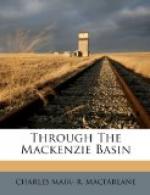Whilst it had been decided that the proposed adjustments should be effected, if possible, upon the same terms as the previous treaties, it was known that certain changes will be necessary owing to the peculiar topographic features of the country itself. For example, in much of it arable reserves, such as many of the tribes retained in the south, were unavailable, and special stipulations were necessary, in such case, so that there should be no inequality of treatment. But where good land could be had, a novel choice was offered, by which individual Indians, if they wished, could take their inalienable shares in severalty, rather than be subject to the “band,” whereby many industrious Indians elsewhere had been greatly hampered in their efforts to improve their condition. But, barring such departures as these, the proposed treaties were to be effected, as I have said, according to precedent. The Commission, then, resting its arguments on the good faith and honour of the Government and people of Canada in the past, looked forward with confidence to a successful treaty in Athabasca, the record of travel and intercourse, to that end, beginning with the following narrative.
Through the Mackenzie Basin
Chapter I
From Edmonton To Lesser Slave Lake.
Mr. Laird, with his staff, left Winnipeg for Edmonton by the Canadian Pacific express on the 22nd of May, two of the Commissioners having preceded him to that point. The train was crowded, as usual, with immigrants, tourists, globe-trotters and way-passengers. Parties for the Klondike, for California or Japan—once the far East, but now the far West to us—for anywhere and everywhere, a C.P.R. express train carrying the same variety of fortunates and unfortunates as the ocean-cleaving hull. Calgary was reached at one a.m. on the Queen’s birthday, and the same morning we left for Edmonton by the C. & E. Railway. Every one was impressed favourably by the fine country lying between these two cities, its intermediate towns and villages, and fast-growing industries. But one thing especially was not overlooked, viz., the honour due to our venerable Queen, alas, so soon to be taken from us.
In the evening we arrived at Strathcona, and found it thronged with people celebrating the day. Crossing the river to Edmonton, we got rooms with some difficulty in one of its crowded hotels, but happily awoke next morning refreshed and ready to view the town. It is needless to describe what has been so often described. Enough to say Edmonton is one of the doors to the great North, an outfitter of its traders, an emporium of its furs. And there is something more to be said. It has an old fort, or, rather, portions of one, for the vandalism which has let disappear another, and still more historic, stronghold, is manifest here as well. And truly, what savage scenes have been enacted on this very




